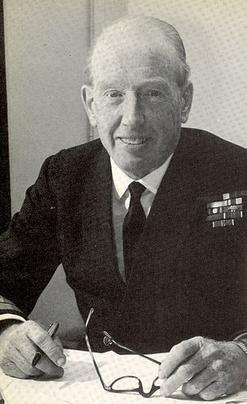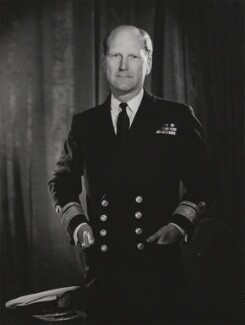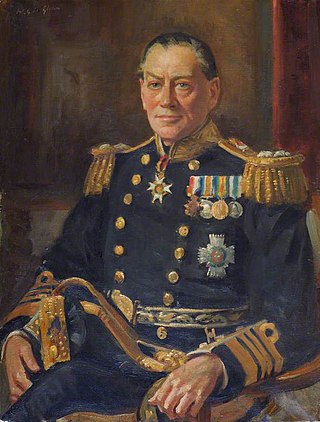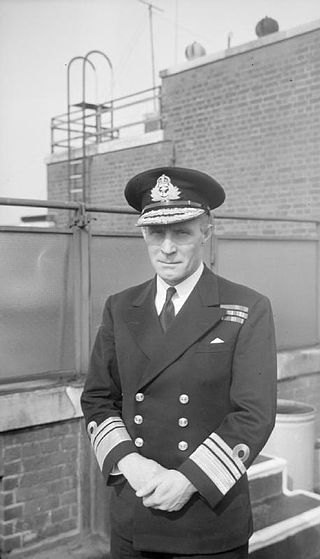
The Royal Naval Reserve (RNR) is one of the two volunteer reserve forces of the Royal Navy in the United Kingdom. Together with the Royal Marines Reserve, they form the Maritime Reserve. The present RNR was formed by merging the original Royal Naval Reserve, created in 1859, and the Royal Naval Volunteer Reserve (RNVR), created in 1903. The Royal Naval Reserve has seen action in World War I, World War II, the Iraq War, and War in Afghanistan.

Admiral of the Fleet Sir Michael Le Fanu was a Royal Navy officer. He fought in the Second World War as gunnery officer in a cruiser operating in the Home Fleet during the Norwegian campaign and the Battle of the Mediterranean and then as gunnery officer in a battleship operating in the Eastern Fleet before becoming liaison officer between the British Pacific Fleet and the United States Third Fleet. After the War he commanded a frigate, a training establishment and an aircraft carrier. He served as First Sea Lord and Chief of the Naval Staff in the late 1960s. In that role, in the face of economic difficulties, he worked hard to reshape the Navy as an anti-submarine force operating primarily in the Atlantic Ocean.
Rear Admiral Sir Paul Woollven GreeningGCVO was a Royal Navy officer and courtier, who served as Naval Secretary and Master of the Household.

Admiral of the Fleet Sir Henry Conyers Leach, was a Royal Navy officer who, as First Sea Lord and Chief of the Naval Staff during the early 1980s, was instrumental in convincing the British prime minister, Margaret Thatcher, that retaking the Falkland Islands from Argentina was feasible. On account of the determination he showed in the matter, journalist and political commentator Andrew Marr described him as Thatcher's "knight in shining gold braid".

Admiral of the Fleet Sir John Julian Robertson Oswald was a senior Royal Navy officer. After training as a gunnery specialist, Oswald commanded a frigate and then a destroyer before achieving higher command in the navy. He served as First Sea Lord and Chief of Naval Staff in the early 1990s. In that capacity he advised the British Government on the reduction in the size of the fleet under the Options for Change restructuring programme and on the deployment of Naval Support for the Gulf War in 1991: he also made the decision that members of the Women's Royal Naval Service should be allowed to serve in Royal Navy ships.
Rear Admiral Sir Christopher Douglas Bonham-Carter, was a Royal Navy officer and Treasurer to the Duke of Edinburgh from 1959 to 1970.
Admiral Sir William Richard Scott Thomas was the Gentleman Usher of the Black Rod in the British Parliament's House of Lords from January 1992 to 8 May 1995.

Admiral of the Fleet Sir Michael Patrick Pollock, was a senior officer in the Royal Navy who rose to become First Sea Lord and Chief of the Naval Staff in the early 1970s. In the Second World War, he was an officer on ships tasked with protecting convoys in the Atlantic and the Mediterranean, and was gunnery officer on the cruiser HMS Norfolk when she fought the German battleship Scharnhorst during the Battle of North Cape. He later commanded the aircraft carrier HMS Ark Royal, and hosted Ian Smith on HMS Tiger. In retirement, he held the position of King of Arms of the Order of the Bath and Gloucester King of Arms, with responsibility for heraldry in Wales.

Admiral Sir Herbert William Richmond, was a prominent Royal Navy officer, described as "perhaps the most brilliant naval officer of his generation." He was also a top naval historian, known as the "British Mahan", the leader of the British Royal Navy's intellectual revolution that stressed continuing education especially in naval history as essential to the formation of naval strategy. After serving as a "gadfly" to the British Admiralty, his constructive criticisms causing him to be "denied the role in the formation of policy and the reformations of naval education which his talents warranted", he served as Vere Harmsworth Professor of Imperial and Naval History at Cambridge University from 1934 to 1936, and Master of Downing College, Cambridge from 1934 to 1946.

Admiral Sir John David Luce, was a Royal Navy officer. He fought in the Second World War as a submarine commander before taking part in the Dieppe Raid and becoming Chief Staff Officer to the Naval Forces for the Normandy landings. He also commanded a cruiser during the Korean War. He served as First Sea Lord and Chief of the Naval Staff in the mid-1960s and in that role resigned from the Royal Navy along with Navy Minister Christopher Mayhew in March 1966 in protest over the decision by the Labour Secretary of State for Defence, Denis Healey, to cancel the CVA-01 aircraft carrier programme.
Admiral Sir Frank Henry Edward Hopkins, was a senior officer in the Royal Navy.
Rear Admiral Sir David Allen, was a senior Royal Navy officer who served as Defence Services Secretary from 1988 to 1991.
Admiral Sir Eric John Arthur Fullerton, KCB, DSO was a Royal Navy officer.
Admiral Sir Richard George Onslow, was a Royal Navy officer who went on to be Commander-in-Chief, Plymouth.

Admiral Sir John Graham Hamilton, was a Royal Navy officer who served as Commander-in-Chief, Mediterranean Fleet from 1964 to 1967.

Admiral Sir Guy Charles Cecil Royle was a Royal Navy officer who went on to be Fifth Sea Lord and First Naval Member of the Royal Australian Navy.
Vice Admiral Sir Iwan Geoffrey Raikes KCB CBE DSC DL was a former Royal Navy officer who became Naval Secretary.
Vice Admiral Sir (Robert) Alastair Ewing KBE CB DSC was a Royal Navy officer who became Naval Secretary.
Vice Admiral Sir George Montague Francis Vallings KCB was a Royal Navy officer who became Flag Officer, Scotland and Northern Ireland.

Admiral Sir Philip Andrew Jones, is a retired senior Royal Navy officer. After service in the South Atlantic in 1982 during the Falklands War, he commanded the frigates HMS Beaver and HMS Coventry. He went on to be Flag Officer, Scotland, Northern England and Northern Ireland, Commander United Kingdom Maritime Forces and Assistant Chief of the Naval Staff before being appointed Fleet Commander and Deputy Chief of the Naval Staff. Jones served as First Sea Lord from April 2016 to June 2019.









